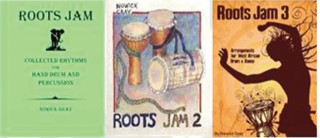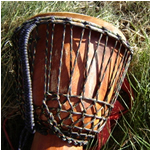Lesson Five: Advanced Notation
Anyone familiar to these pages has noticed a recurrent theme: rhythms which combine a three feel with a four feel. It might be useful here to digress to the why of the predominance of these two numbers. I would answer with two words: heartbeat and walking. If I am to believe my drum-friend Hamish, the heart beats with a three rhythm: thump-thump-um thump-thump-um,
_____ _____
| | | | | |
x x - x x -
whereas the rhythm of walking is obviously a two (or four) back-and-forth rhythm..or so it seems at first glance.
Let's go right into another three and four combination rhythm, exploring a couple of ways to notate it--one based on the three-measure, one based on the four. While the choice is arbitrary, in the playing, each will carry its own feel.
1.
_____ _____ _____ _____
| | | | | | | | | | | | (continue...>)
G - g T - d G - g T - dd
_____ _____ _______ _______
| | | | | | | | | | | | | |
G - g T - d G - g d g d P d
In this notation the whole pattern of eight bars carries a three feel--that distinctive swaying motion characterized by alternating hands for the strong first beat of each measure--for the first six bars, and then switches to a four feel for the final two bars. With this exercise you can really experience the difference
Now let's see what happens if you stretch those first six bars by just one beat each, going to a strictly four-four arrangement:
2.
_______ _______ _______ _______
| | | | | | | | | | | | | | | | (continue...>)
G - - d P - - d G - - d P - g d
_______ _______ _______ _______
| | | | | | | | | | | | | | | |
G - - d P - - d G - g d g d P d
Here the feel of the four is more square, less rounded and swaying, and leads always with the same hand. This rhythm is more regular and consistent, perhaps with a loss of challenge and novel interest. In effect, it's really a different pattern than number one, because the feel is so different.
Sevens Wild
Here we go again! Give this one a whirl and tell me you don't like sevens...
_____ _____ _______ _______| | | | | | | | | | | | | |
T - D P - G d g T - D g d
Playing around with a venerable 6/8 African rhythm, Tiriba, I found myself drawn to the underlying feel of it and heard the old faithful samba at work. All these roots go so deep. Here are the three main djembe parts as I learned them from Mamady Keita:
_____ _____ _____ _____ | | | | | | | | | | | | D P d - P - D P - D P -
D - - g T - D - - g T -
D - T G d g D P - G d g
Notice first the obvious tone set by the metronomic "P" of the first part. But look also at the counterpoint provided by an underlying two/four feel: notes number one (D), three (d), and five (P) (in bold). The third part reinforces this undercurrent even more strongly with the "T" as the third beat, which in turn sets up the "d" that follows as also a point of emphasis. The overall effect comes out like this:
_____ _____ _____ _____ | | | | | | | | | | | | X X X X
This is the essential movement of the classic samba, though the samba's in four:
_______ _______ _______ _______ | | | | | | | | | | | | | | | | T - T - D - - P - P - g D g d g or:
d g d g D - d P - g d g D - D - or:
D - D - T - d G - G - g d g d g etc.
Return to Top
 Go to Rhythms
of the Week, Page One
Go to Rhythms
of the Week, Page One
 Go to Rhythms
of the Week, Lesson Two
Go to Rhythms
of the Week, Lesson Two
 Go to Rhythms
of the Week, Lesson Three
Go to Rhythms
of the Week, Lesson Three
 Go to Rhythms
of the Week, Lesson Four
Go to Rhythms
of the Week, Lesson Four
 Go
to Rhythms of the Week, Lesson Six
Go
to Rhythms of the Week, Lesson Six
 Go
to Rhythms of the Week, Lesson Seven
Go
to Rhythms of the Week, Lesson Seven
 Go
to Rhythms of the Week, Lesson Eight
Go
to Rhythms of the Week, Lesson Eight
 Go
to Rhythms of the Week, Lesson Nine
Go
to Rhythms of the Week, Lesson Nine
See lots more rhythm notation and drum lessons in my Roots Jam rhythm books, with optional audio files (CD or mp3). And read my latest tips and insights about drumming: African Drumming Blog. Learn from my early learning experiences as a hand drummer, with the free ebook, Friday Night Jam.
 Cougar WebWorks
Cougar WebWorks 


